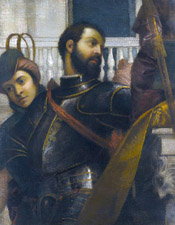El Cantar de mío Cid (The Song of My Lord)
, translated by Kline, A.S., (contact-email)
‘El Cantar del mío Cid’, or ‘The Song of My Lord’ the oldest Castilian epic poem extant, and Spain’s national epic, exists in a single fourteenth century codex, but was composed earlier, in the twelfth century, or as late as the early thirteenth. It tells of Rodrigo (Ruy) Díaz de Vivar (c1043-1099AD), known as El Cid (Lord) and El Campeador (Master of the Battlefield). The poem is set in the eleventh century, an age of warfare amongst the northern Christian and the central and southern Muslim realms of Spain, marked by shifting alliances. Born in Vivar, near Burgos, Díaz served in the armies of both Christian and Muslim rulers, ultimately wresting the principality of Valencia from Muslim control, and ruling there until his death. His fraught relationship with Alfonso VI (c1040-1109AD), King of León and Castile, who twice exiled Díaz from his realm, was a central determinant in his military career. El Cid’s rule of Valencia was tolerant of both Christian and Muslims alike, and won him popular support. He countered the attempts of the Almoravid Berbers, who had made successful incursion into Spain from North Africa in 1086AD, to conquer Valencia, and he inflicted on them their first major defeat, in 1094AD, on the plain of Cuarte (Quart de Poblet), outside the city. He died, his cause of death uncertain, on July 10th, 1099AD. The tomb of Diaz and his wife Jimena is located in Burgos cathedral. She and her retinue fled to Burgos, bearing the body of her husband, in 1101AD, prior to the fall of Valencia to the Almoravids in 1102AD. The poem begins with the departure of Rodrigo, from his home in Vivar, to the first of the two exiles decreed by Alfonso. In the poem his first exile (1081AD) and his second (1089AD) are merged, and are precursors to Rodrigo’s campaigns in the Spanish Levant, ending in his conquest of Valencia, and the tale of his claim for justice against the (likely fictitious) infantes of Carrión.

Kline, A.S.,
Support Open-Access:
Your contribution keeps our classical translations available to all. Every dollar helps support classics education and funds the expansion of our catalogue. Value what we do? Donate now.
File Downloads:
© Copyright, All Rights Reserved. This work may be freely reproduced, stored and transmitted, electronically or otherwise, for any non-commercial purpose. Conditions and Exceptions apply.